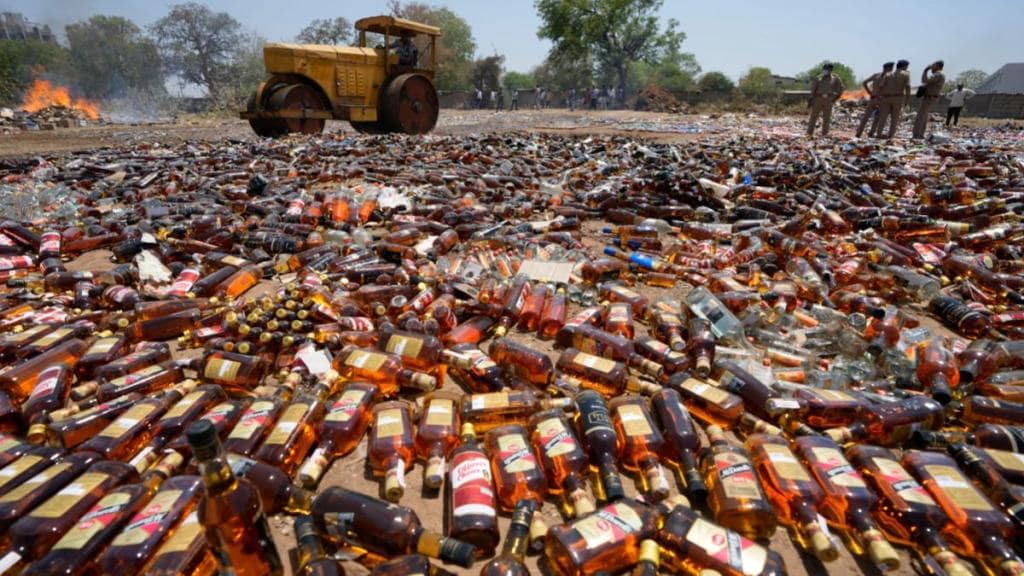Bihar Election 2025: Bihar, with over 13 crore population, is living under total prohibition since 2016 — arguably the largest population-level social experiment in the world. Even so, the flow of illicit liquor has reportedly never ceased in the state with bootleg chains forcing authorities into a cat-and-mouse chase. As elections approach, the liquor ban has become a potent political flashpoint, raising questions over its costs, benefits and sustainability.
Notably, prior to imposing prohibition, CM Nitish Kumar expanded liquor licenses and promoted alcohol sales to boost revenues. This policy did fill state government coffers but fueled a social crisis of alcohol abuse and domestic violence. Before the ban, Bihar reported one of the highest rates of domestic violence in India, with nearly 40% of women affected.
Therefore, prohibition, particularly supported by women voters, was framed as a measure to protect families. A 2024 Lancet study estimated that the ban prevented approximately 2.1 million cases of intimate partner violence
2016 Prohibition: Ambition and reaction
When Nitish Kumar pushed the Bihar Prohibition and Excise Act, 2016, it was packaged as a reform for higher public health and social welfare. The intent was to curb alcohol misuse and lift living standards. The government announced that both the manufacture and consumption of liquor would be illegal statewide. The transition was swift and within five days, the earlier ban only on country liquor was extended to all alcohol.
In the years since, the law has drawn praise and criticism. The Patna High Court in an order last year said that the prohibition law currently finds itself “on the wrong side of history”. The HC accused officials in the excise, police, tax and transport departments of colluding with bootleggers and warned that the poor become both victims in hooch tragedies and offenders simply for consumption.
Before imposing prohibition, Nitish Kumar had taken the opposite route. The CM widened the net of liquor licences and actively promoted alcohol sales to fatten state revenues. The policy did fill Bihar’s coffers but it came at a heavy social cost: alcohol abuse soared, and with it, incidents of domestic violence spiralled.
Despite the controversy, many women in Bihar continue to support the ban, citing fewer incidents of domestic violence. But they also point towards the rise of illicit liquor and arbitrary arrests of casual drinkers.
Numbers tell a story
According to the Lancet study, the prevalence of weekly alcohol consumption among men before the ban grew from 9.7% to 15.0%. Of those male drinkers, around 69.8% obtained liquor from commercial sources. The 2024 study indicated that those numbers have reversed: weekly intake plunged to 7.8% and legal purchases fell while illegal sourcing climbed.
However, the human cost of illicit alcohol continues. According to official data, around 300 poisoning deaths have been reported since 2016 — the common sentiment on ground sees this number as an undercount.
Fiscal estimates
Critics like Prashant Kishor, founder of Jan Suraaj Party, claim the state loses as much as Rs 20,000 crore annually to the ban. Kishor argues that money could fuel the education sector and other developmental works in the state. In his public rallies, Kishor has pledged that if prohibition is lifted, funds saved would be channeled to transform school systems in Bihar. “The first that will be done in a matter of a few hours will be lifting this fake alcohol ban in Bihar,” he said in an interview.
Currently, only four Indian states impose prohibition – Gujarat, Mizoram, Nagaland and Bihar.
Enforcement, backlash and legal strain
The state government has tried incremental reforms to soften prohibition’s edges. Penalties were reduced from 10 years’ imprisonment to 5 years, first-time offenders can now pay fines instead of jail time and the seizure of homes or vehicles was relaxed.
Still, the courts struggle. In 2021, then Chief Justice of India NV Ramana warned that prohibition had clogged courts with nearly 3,00,000 pending liquor cases, especially high volumes of bail petitions.
The judiciary has chafed under the burden; critics argue the law’s blanket enforcement is untenable in practice. Meanwhile, corruption allegations, local resistance and intensifying smuggling have kept the ban in constant crisis mode.
Politics, election cycles and the road ahead
Prohibition has long been a political tool as much as a social policy. When Nitish Kumar first implemented the ban, it helped galvanise women’s support. In 2020, Kumar even pushed for a national prohibition campaign, though it gained no traction.
Bihar’s next legislative election looms and whether the electorate endorses prohibition as a moral experiment or rejects it as impractical will be a key question. The polls in the state are slated to be held in two phases on November 6 and 11. The Bihar assembly poll results will be announced on November 14.


